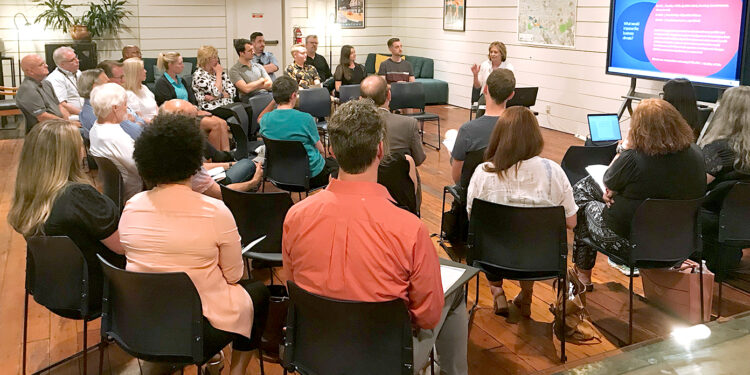Springfield Chamber’s Roundtable Event Explores Business Challenges and Solutions

On Tuesday, June 27th, the Springfield Area Chamber of Commerce convened business and civic leaders from around the region for a roundtable discussion on our area’s business climate. The Roundtable program, facilitated by Chamber President & CEO Vonnie Mikkelsen, explored feedback from members regarding barriers to development, workforce and talent, and business operations.
The information from the community was collected from a business climate survey released immediately following the Chamber’s State of Business program in May, 2023. Feedback was centered around the challenges and opportunities of doing business in Springfield, Eugene, Lane County, and Oregon.
Roundtable Discussion
Mikkelsen began the facilitated discussion by sharing feedback from members’ experiences doing business in the region, including barriers to growth and competitive advantages. Many respondents identified talent and workforce – specifically, finding and training qualified talent, competing for talent, and paying competitive wages and benefits – to be among their top business challenges. Respondents also identified taxes, the regulatory environment, and supply chain issues as top challenges to business operations. Finally, access to capital and development fees were diagnosed as a major barrier to development.

Regarding strengths, a majority of respondents identified environment and quality of life as the two biggest competitive advantages of doing business in Oregon.
Discussions centered primarily on obstacles to new development, as well as opportunities to find collaborative ways to alleviate these barriers. Construction and development organizations attending the program shared statewide permitting processes which have contributed to delays and increased costs in projects. City of Springfield leadership and staff, having spent several years updating Springfield’s development code to make it more business friendly, expressed a vision for continued improvements that will help developers navigate permitting and other development processes more efficiently and autonomously.

In addition, there was a robust discussion on System Development Charges (SDCs) and ways in which the structure of these fees might be altered to help support additional development.
Housing shortfalls also emerged as a major challenge to business interests; both public and private sectors agreed that housing development should be a priority in addressing workforce retention and recruitment. There was concern that, with current regulations, Oregon will not be able to fulfill housing development goals over the next five years. Affordable and market-rate housing across various income brackets was highlighted as essential, as was the need for a coordinated effort to address these challenges and ensure meaningful support from the state.
Takeaways
The Roundtable fostered connections among Springfield businesses, with attendees expressing excitement about future collaborations.

Overall, there was agreement that improving the perception of business-friendliness within the community was crucial, and required further open dialogue to arrive at equitable solutions between the public and private sectors. Despite this gap, there were many innovative ideas for how collaborations can improve the business dynamic in Springfield.
To find out more about upcoming Chamber Roundtables, please call 541-746-1651 or e-mail Paige Walters.
Discover more from Springfield Bottom Line
Subscribe to get the latest posts sent to your email.



